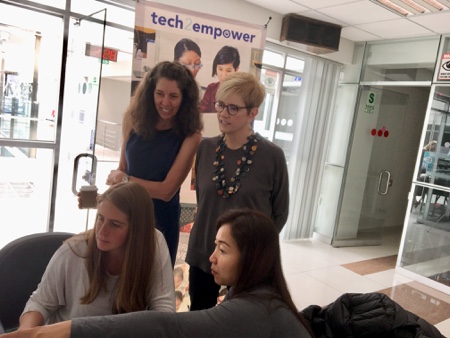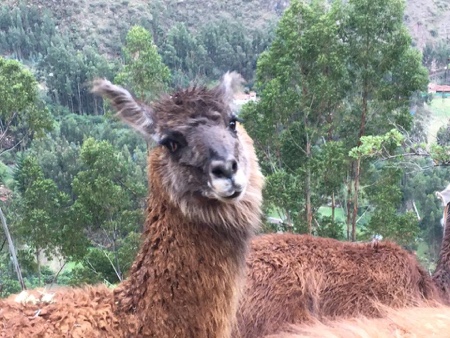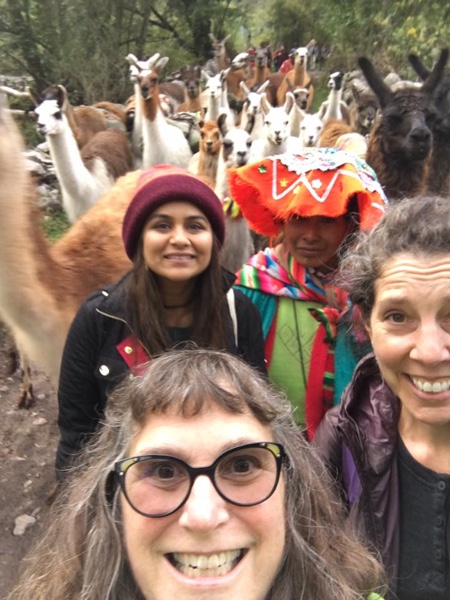
Last week I was got to work on a week-long service trip in Cusco, Peru as part of Wake: Women’s Alliance for Knowledge Exchange #Tech2empower program where women who work in technology volunteer to share their professional skills and knowledge with women-run business owners.
The team I worked with helped social entrepreneur Alejandra Arias Stella, the co-founder of the Llama Pack Project to build a reservation system for the Llama treks. The team consisted of volunteers from Google, including Cindy Xin Wang, Kate Wilcox and Jenna McGraw. In the photo, the team is walking her through some of the technical parts of the new system.
There was tremendous value for Alejandra to have two full days of access to technical experts to help solve her technical problems. That is what the #Tech2Empower program is all about!
The next day, the whole group had an opportunity experience The Llama Pack Project first hand, by going on a half-day trek in the Sacred Valley.

That photo above is a picture of one of Mr. Luis’s llama looking straight at me part way through our trek. That llama does not have a name, but he is Chaku type llama, one of the furrier types. Mr. Luis and his family are from the high Andean community of Suttoc-Paccha.

Mr. Luis (second from the left) and his family were our guides on the trek. They had to get up at 3:00 am to walk to the office and meet us to start our trek.
The scenery on the trek was some of the most breathtaking beautiful I have ever seen. And, while the hike was steep, it was not as steep as the Stanford Dish where I walk all the time, but at high altitude is was a workout.

That women with a baby on her back is Mr. Luis’s wife. She walked up the steep climb with the baby on her back. She and others in the family watched us to make sure we were not slipping on the muddy trail and often extended their hands to help us. As I learned later, it was to make a connection. I really appreciated the help.

We stopped for lunch. Mr. Luis’s family cooked up a traditional lunch in an earth oven. It consisted of potatoes, vegetables, corn, and chicken. When cleaning up, the untouched food went to the family, the scraps were reserved for the Llamas. Then we packed up and made our way back down the mountain.

The Llama Pack Project partners with indigenous families like Mr. Luis’s family to create an economic development model that allows these families to earn an income through their llamas. These native animals are perform pack labor but also provide eco-friendly pack services for tourism.
As I learned from Alejandro, Mr. Luis’s family and other High Andean families have little access to education and training, dramatically limiting their job opportunities despite living in one of the fastest growing adventure tourism destinations in South America.
Prior to the Llama Pack Project’s work, families like Mr. Luis faced systemic racism because of their culture and llamas, (the poorest people in the region are those with llamas.) The Llama Pack Project has literally transformed their lives because they able to earn a decent annual wage with their llamas.
Before we started our hike, we learned that the use of llamas was replaced by introduced mules during the Spanish Conquest. Mules are destructive to mountain ecosystems due to their heavy feet and their poop. Llamas have “pillow” feet and do not harm the trails, neither does their poop.
Unfortunately, traditional tour companies use mules because they can carry heavier loads, but using mules does not provide work or training to local people like Mr. Luis and his family. A well bred llama can compete with mules in load capacity without damaging this fragile and beautiful mountain ecosystem. Training in breeding is part of the program.
The Llama Pack Project does more than provide income. They teach local families healthy llama breeding practices, tourism services and environmental literacy. This is a win-win, families get to benefit from tourism and they also encourage commercial tour companies to use more sustainable practices that help protect the mountains.
If you are interested in learning more about Wake and their #Tech2Empower Program, visit their web site. If you ever find yourself in Cusco, Peru, you must book a trek with the Llama Pack Project.
Beth Kanter is a consultant, author, influencer. virtual trainer & nonprofit innovator in digital transformation & workplace wellbeing.
